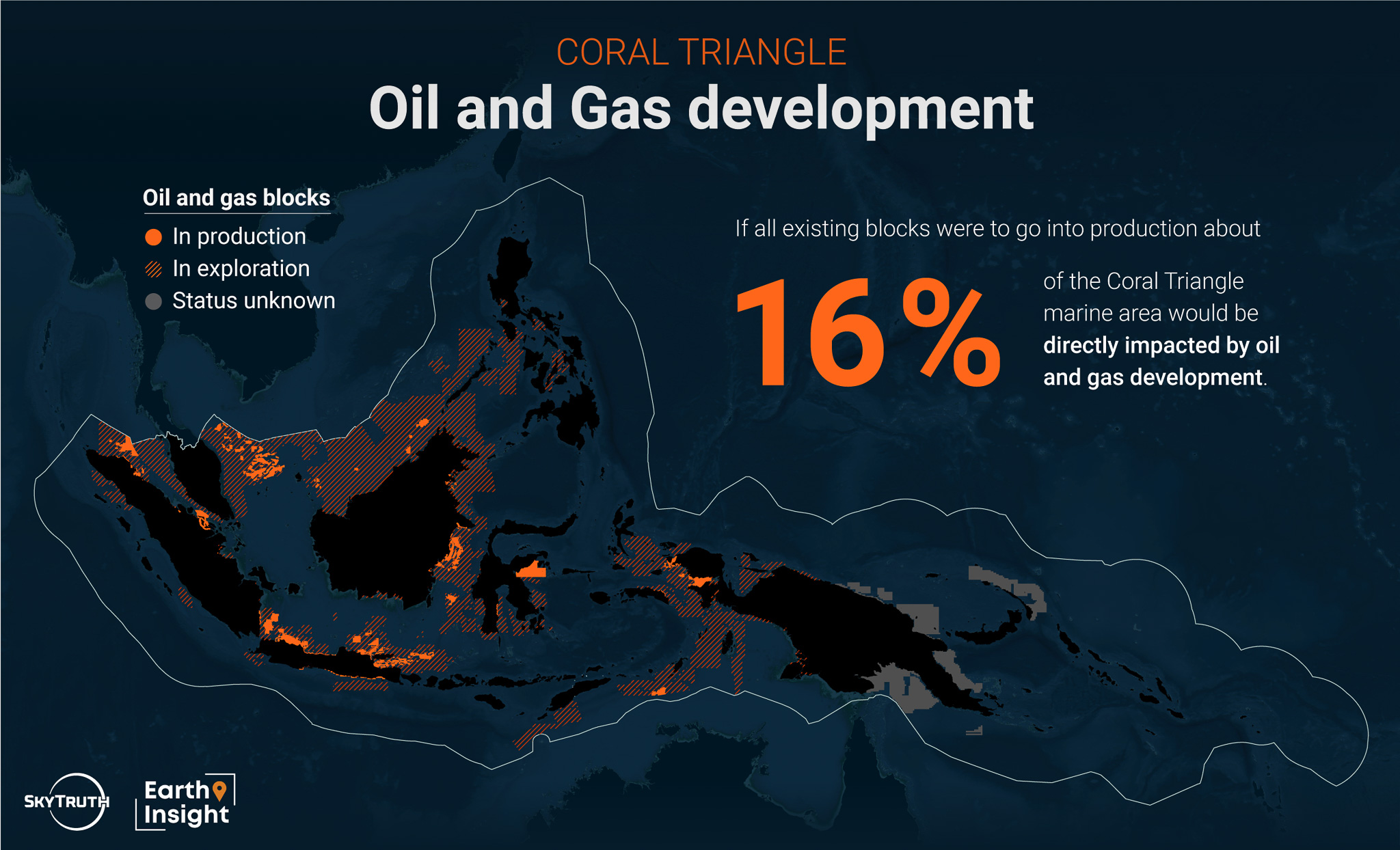Mongabay, November 13,2024
Ashley Yeong
- A new report warns that the expansion of oil, gas and liquefied natural gas projects in the Coral Triangle region in the Western Pacific risks unleashing more oil spills, direct damage to coral reefs, noise pollution and ship traffic, not to mention greenhouse gas emissions.
- More than 100 offshore oil and gas blocks are currently in production, and more than 450 additional blocks are earmarked for future exploration, according to the report. If these projects are approved, the production and exploration blocks would cover 16% of the Coral Triangle, an area the size of Indonesia, the report states.
- The report notes there is already overlap between oil and gas operations and critical conservation zones, including 16% of the Coral Triangle’s marine protected areas.
- The Coral Triangle is one of Earth’s most biodiverse regions, stretching across the waters of the Philippines, Indonesia, Malaysia, Papua New Guinea, Timor-Leste and the Solomon Islands. It’s home to 76% of all known coral species, as well as numerous endangered marine species.
Fossil fuel projects are putting the Pacific Coral Triangle’s unique marine ecosystem at risk, according to a new report presented Oct. 31 at the U.N. Convention on Biological Diversity summit (COP 16) in Cali, Colombia.
The report warns that the expansion of oil, gas and liquefied natural gas (LNG) projects in the region risks unleashing more oil spills, direct damage to coral reefs, noise pollution and ship traffic, not to mention greenhouse gas emissions. The additional stressors, combined with existing challenges of a warming sea, could push the Coral Triangle’s fragile marine ecosystem past its tipping point, according to the report.
The Coral Triangle is one of Earth’s most biodiverse regions, stretching across the waters of the Philippines, Indonesia, Malaysia, Papua New Guinea, Timor-Leste and the Solomon Islands. It’s home to endangered marine species like green turtles (Chelonia mydas) and oceanic manta rays (Mobula birostris), as well as 76% of all known coral species. Fifteen coral species are endemic to the region, which means they aren’t found anywhere else.
The Coral Triangle nations’ need for more energy is certain. Energy consumption is predicted to triple by 2050 as a result of “population growth and development needs,” according to the report. Despite significant investments in renewables, fossil fuel projects are growing quickly. The report states that more than 100 offshore oil and gas blocks are currently in production, and more than 450 additional blocks are earmarked for future exploration. If these projects are approved, the production and exploration blocks would cover 16% of the Coral Triangle, an area the size of Indonesia, the report states.
The report, prepared by U.S.-based conservation mapping nonprofits Earth Insight and SkyTruth, notes there is already overlap between oil and gas operations and critical conservation zones. These include 11% of the Coral Triangle’s key biodiversity areas, 16% of its marine protected areas, and 11% of its important marine mammal areas. Within these zones, 24% of coral reefs, 22% of seagrass meadows and 37% of mangrove forests overlap with current or planned oil and gas blocks.
“Expanding fossil fuel in the Coral Triangle is a dangerous course of action,” Florencia Librizzi, Earth Insight’s program director, said in a statement. “Not only does it threaten one of the world’s most biodiverse marine ecosystems, it also jeopardizes the future of millions of people who rely on a clean ocean.”

Coral reefs at severe risk
The report’s findings were “extremely alarming,” said Affendi Yang Amri, a coral reef ecologist with the Institute of Ocean and Earth Sciences at the University of Malaya, Malaysia.
“The vast coral networks that make up the Coral Triangle are well-known for their ability to sustain biodiversity through species migration and gene transfer,” Affendi, who was not involved in the report, told Mongabay by email. But, he said, when oil and gas industries are set up in the area, they can break up large coral reefs into smaller, isolated patches. This weakens the overall ecosystem and the genetic diversity of the reef.
Affendi stressed that energy development plans in the Coral Triangle must have marine conservation strategies.
“We must adapt to co-exist with industrial activities that may be unavoidable in certain areas,” he said. “This could mean implementing ‘buffer zones’ around critical habitats, more rigorous impact assessments, and requiring industries to use low-impact construction and operational techniques.”
According to Affendi, oil and gas facilities affect coral ecosystems through dredging, reclamation, and pipeline construction, which raise sedimentation and discharge chemical pollutants, making it harder for them to grow.
Reduced water quality and light penetration make it harder for corals to photosynthesize, which makes them more vulnerable to bleaching. When stressed, corals expel the algae that live in them, turning white as a result; long-term bleaching starves and kills corals. Globally, corals are currently undergoing the largest mass bleaching event on record.
“Corals are extremely sensitive to changes in their physical surroundings,” Affendi said. “Even little physical disturbances can have a significant impact on biodiversity in coral ecosystems.”
Affendi expressed concern over how regulations will be enforced. “Even with stricter LNG regulations, coral ecosystems would still face damage, though improved oversight can certainly mitigate some of the risks,” he said, suggesting that oil and gas companies be mandated to pay deposits to be used for cleanup efforts in the event of an incident.
Read full article in Mongabay

